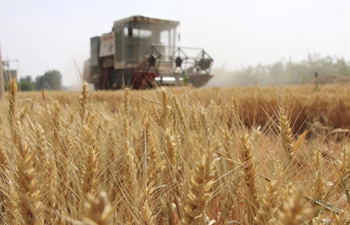CHICAGO, June 4 (Xinhua) -- An international team of researchers is now a step closer to developing a universal flu vaccine after proving that targeting a specific area of the flu virus does protect humans.
For the study, the researchers from the University of Michigan, the Icahn School of Medicine at Mount Sinai and other institutions looked at naturally occurring influenza cases in a cohort investigators have followed in Nicaragua for years.
After one member in a household was determined to have the flu, the researchers took blood samples to test the rest of the household. They looked at who was infected with the virus antibodies and who got sick.
Traditionally, an antibody concentration of 1:40, measured in the hemagglutination inhibition assay, has been used as a 50-percent correlate of protection from clinical disease, which means that half of the people who have those levels will be protected from influenza.
In the study, the researchers found a similar protection, corroborating the idea that the field study design is sound to examine correlates of protection. They also found that a rise of four times in the amount of stalk antibody levels correlated with 42-percent reduction in influenza infection.
"We were able to show that stalk antibodies do correlate with protection," said Aubree Gordon, a professor of epidemiology at UM's School of Public Health. "That is great news as it supports the idea that stalk antibodies may be able to provide protection against influenza and could enable scientists to design a broader, more effective influenza vaccine."
The flu virus is covered with two types of proteins: hemagglutinin and neuraminidase. The current flu vaccine targets the head of the hemagglutinin, a lollipop-like structure, which is the part that changes most often. If they target the stem of the hemagglutinin, instead of the head, it would allow them to prevent a wider range of flu viruses, as these do not change as often.
"Our research is the first to demonstrate that scientists are right in attempting to develop antibodies that target this specific location as a novel universal influenza virus vaccine candidate," Gordon said.
The study also showed new tests can be used in flu research.
"An additional finding of this study is that ELISA based readouts can be used as independent correlate of protection," said Florian Krammer, a professor of microbiology at the Icahn School of Medicine at Mount Sinai. "ELISAs are binding assays and do not indicate functionality, but are much easier and quicker than functional assays."
"While there are caveats and further studies needed, this is good news for the development of stalk-based universal influenza virus vaccines," Krammer said. "It seems we are on the right track."
The study has been published in the June issue of Nature Medicine.

















